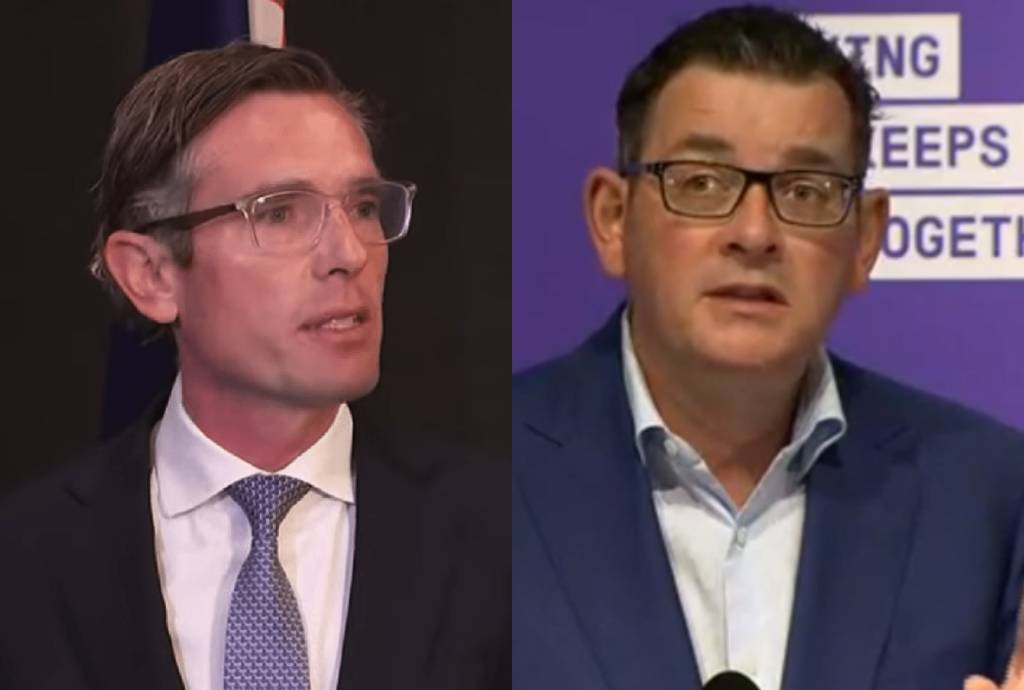Here’s How Omicron Could Impact Your Interstate Travel This Christmas
These are the rules you need to be across.

The festive season is upon us once again and for a second year in a row, many of us are anxiously watching from the sidelines as a new COVID variant threatens to wreak havoc on our holiday travel plans.
Thankfully, it looks like the latest Omicron variant is less severe and dangerous than the Delta outbreak that hit Australia just before last Christmas. However, as we know all too well (10-minute version) after two years of living with COVID, things can change really quickly.
So, without further ado, let’s break down exactly how Omicron will impact your Christmas travel plans.
Note: This is subject to change, check your local health website for the most accurate, up-to-date travel information.
New South Wales
There are no current interstate border restrictions in place in New South Wales, which has a majority of Australia’s known Omicron cases right now. Dominic Perrottet has been in regular contact with Victorian Premier Daniel Andrews and the pair are keen to keep the border between the two most populous states open over Christmas.
“We also know this variant won’t be the last one,” Perrottet said. “That is why vaccines remain our best defence. COVID-19 is not going anywhere anytime soon so we must learn to live alongside it. Going into lockdown or closing borders is not the solution; getting the jab is.”
Victoria
As it currently stands, there are no border restrictions to enter Victoria from other states. Unless you’ve been overseas in the last 14 days, you’re free to enter Victoria without needing a test or to isolate upon arrival.
Additionally, Dan Andrews has confirmed that the state will not be pursuing an “Omicron zero” strategy, so there’s a pretty slim chance the border will slam shut at the last minute. “We will not be pursuing an ‘Omicron zero’ here. We don’t think that makes any sense,” Andrews said. “The good news so far is that while it is more infectious, the evidence suggests that it is milder and some in the scientific community have been talking about the fact that this may well replace Delta and that on balance might be a net positive.
“We think that it is very important not only for the people of Victoria and the people of NSW, but if Victoria and NSW are working closely together than that’s pretty good for the rest of Australia as well.”
Queensland
Despite the Omicron variant, Queensland has actually brought forward its border reopening from December 17 to December 13.
From that date, the border will open to all fully vaccinated travellers (including from hotspot areas like NSW and Victoria) without the need to quarantine. However, people arriving from hotspots will have to test negative 72 hours prior to arrival and will have to have another test on day 5.
However, Acting Chief Health Officer Peter Aitken has warned anyone entering the state to be particularly vigilant, given the easing of border restrictions amid a new strain outbreak.
“The vaccination stops people getting really sick, it doesn’t stop people getting COVID. So we just ask everyone to think about that as our borders open up – think about, if you’re going into crowded places or you’re visiting elderly relatives, wear a mask. If you’ve got symptoms, come forward and get a test,” he said. “If you haven’t been vaccinated already, get vaccinated.”
South Australia
South Australia hasn’t ruled out closing the border because authorities are “extraordinarily concerned” about Omicron.
Some restrictions have already been introduced in recent days, with visitors from NSW, Victoria and the ACT now being required to test and isolate upon arrival until they return a negative result, then test again on day six.
However, Premier Steven Marshall also just straight-up refused to rule out closing the border completely. “We are very concerned (about Omicron). We’re meeting on a very regular basis and we don’t take any option off the table,” Marshall said.
At this stage, you have some options — depending on where you’re coming from — but it is probably worth starting to make some alternative plans now in case the situation changes.
Australian Capital Territory
Omicron has already entered the nation’s capital, but it’s also worth noting that the ACT has an impressive 98 percent double vaccination rate. There are some restrictions for travellers entering from high risk areas, but if you’re fully vaccinated, there is no quarantine requirement.
The ACT Government is yet to hint at any further restrictions being introduced as a result of Omicron.
Northern Territory
As it currently stands, the Northern Territory is only accepting fully vaccinated arrivals without quarantine. If you’re not vaccinated, you must quarantine at a purpose-built facility until you receive a negative test result.
However, the NT has declared a number of hotspots in NSW, Victoria, the ACT and South Australia, so it’s worth checking before you make your travel arrangements or you could be up for a seven day quarantine upon arrival.
Tasmania
Tasmania’s travel advice is set to change on December 15, 2021 to allow more Australians into the state. There are still restrictions in place for those coming from areas deemed high-risk, but the state has completely banned international arrivals from all overseas countries — not just those with Omicron outbreaks.
The only exception to this rule is New Zealand’s South Island.
Western Australia
As has been the case throughout a majority of the pandemic so far, Western Australia has effectively shut itself off to most of the rest of the country as part of its “controlled border arrangement.”
Queensland and Tasmania are currently the only two states considered “very low risk” and therefore the only residents who can enter without quarantine. However, we’re expecting further announcements on the Western Australia border later this week, so this is all very much subject to change right now.